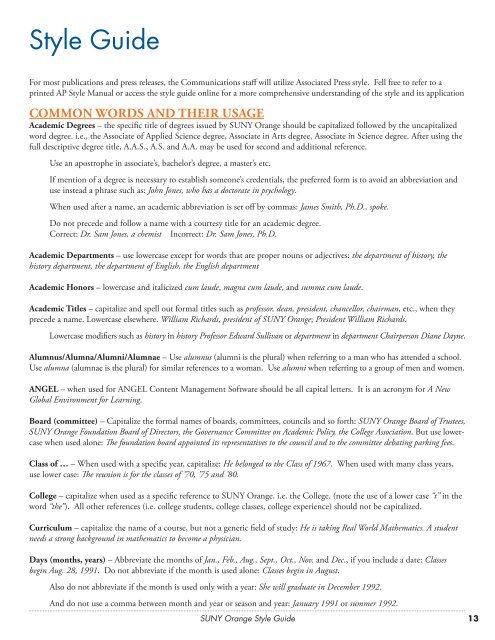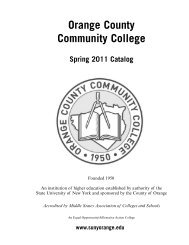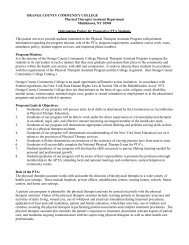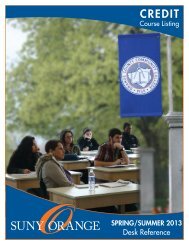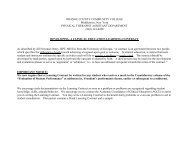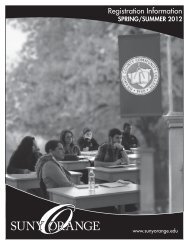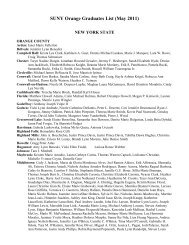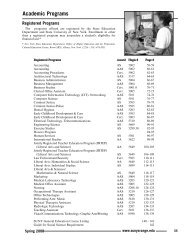Style Guide - SUNY Orange
Style Guide - SUNY Orange
Style Guide - SUNY Orange
You also want an ePaper? Increase the reach of your titles
YUMPU automatically turns print PDFs into web optimized ePapers that Google loves.
<strong>Style</strong> <strong>Guide</strong><br />
For most publications and press releases, the Communications staff will utilize Associated Press style. Fell free to refer to a<br />
printed AP <strong>Style</strong> Manual or access the style guide online for a more comprehensive understanding of the style and its application<br />
Common Words and their usage<br />
Academic Degrees – the specific title of degrees issued by <strong>SUNY</strong> <strong>Orange</strong> should be capitalized followed by the uncapitalized<br />
word degree. i.e., the Associate of Applied Science degree, Associate in Arts degree, Associate in Science degree. After using the<br />
full descriptive degree title, A.A.S., A.S. and A.A. may be used for second and additional reference.<br />
Use an apostrophe in associate’s, bachelor’s degree, a master’s etc.<br />
If mention of a degree is necessary to establish someone’s credentials, the preferred form is to avoid an abbreviation and<br />
use instead a phrase such as: John Jones, who has a doctorate in psychology.<br />
When used after a name, an academic abbreviation is set off by commas: James Smith, Ph.D., spoke.<br />
Do not precede and follow a name with a courtesy title for an academic degree.<br />
Correct: Dr. Sam Jones, a chemist Incorrect: Dr. Sam Jones, Ph.D.<br />
Academic Departments – use lowercase except for words that are proper nouns or adjectives: the department of history, the<br />
history department, the department of English, the English department<br />
Academic Honors – lowercase and italicized cum laude, magna cum laude, and summa cum laude.<br />
Academic Titles – capitalize and spell out formal titles such as professor, dean, president, chancellor, chairman, etc., when they<br />
precede a name. Lowercase elsewhere. William Richards, president of <strong>SUNY</strong> <strong>Orange</strong>; President William Richards.<br />
Lowercase modifiers such as history in history Professor Edward Sullivan or department in department Chairperson Diane Dayne.<br />
Alumnus/Alumna/Alumni/Alumnae – Use alumnus (alumni is the plural) when referring to a man who has attended a school.<br />
Use alumna (alumnae is the plural) for similar references to a woman. Use alumni when referring to a group of men and women.<br />
ANGEL – when used for ANGEL Content Management Software should be all capital letters. It is an acronym for A New<br />
Global Environment for Learning.<br />
Board (committee) – Capitalize the formal names of boards, committees, councils and so forth: <strong>SUNY</strong> <strong>Orange</strong> Board of Trustees,<br />
<strong>SUNY</strong> <strong>Orange</strong> Foundation Board of Directors, the Governance Committee on Academic Policy, the College Association. But use lowercase<br />
when used alone: The foundation board appointed its representatives to the council and to the committee debating parking fees.<br />
Class of … – When used with a specific year, capitalize: He belonged to the Class of 1967. When used with many class years,<br />
use lower case: The reunion is for the classes of ’70, ’75 and ’80.<br />
College – capitalize when used as a specific reference to <strong>SUNY</strong> <strong>Orange</strong>. i.e. the College. (note the use of a lower case “t” in the<br />
word “the”). All other references (i.e. college students, college classes, college experience) should not be capitalized.<br />
Curriculum – capitalize the name of a course, but not a generic field of study: He is taking Real World Mathematics. A student<br />
needs a strong background in mathematics to become a physician.<br />
Days (months, years) – Abbreviate the months of Jan., Feb., Aug., Sept., Oct., Nov. and Dec., if you include a date: Classes<br />
begin Aug. 28, 1991. Do not abbreviate if the month is used alone: Classes begin in August.<br />
Also do not abbreviate if the month is used only with a year: She will graduate in December 1992.<br />
And do not use a comma between month and year or season and year: January 1991 or summer 1992.<br />
<strong>SUNY</strong> <strong>Orange</strong> <strong>Style</strong> <strong>Guide</strong><br />
13


